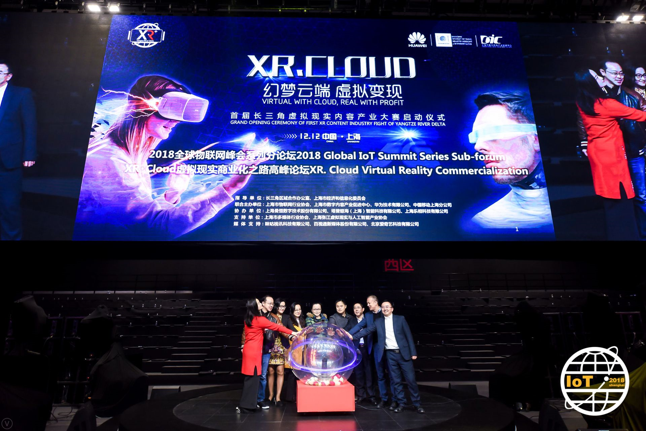The 2018 XR·Cloud Virtual Reality Commercialization Path Summit and the inaugural “Yangtze River Delta Virtual Reality Content Industry Competition” were successfully launched in Shanghai on December 12, 2018. Representatives from leading global XR enterprises gathered to discuss the challenges and opportunities of XR in the 5G era. (Summit Opening Ceremony)
Under the theme “Dreams in the Cloud, Virtual Monetization,” the forum invited key players in the global XR industry chain, including DPVR, VR Europe Day, Shanghai Mobile, Huawei, Migu Video, Lenovo New World, Digifluid, Israel Human Eye Technology, and Xijian Technology. Discussions covered the current industry landscape, operator strategies, 5G empowerment, Cloud VR, XR hardware & content, and future business scenarios. A consensus was reached: 5G Cloud VR is set to drive widespread VR adoption, and the XR industry will inevitably transform various commercial landscapes in the future. XR technologies (VR, AR, MR) offer immersive, three-dimensional, and interactive experiences that inspire limitless imagination. However, widespread VR adoption faces bottlenecks due to limited network bandwidth, high hardware costs, and chip performance constraints. Representing VR terminal hardware manufacturers, Zhang Li, Partner and Chief Strategy Officer of DPVR, shared insights from a user perspective, emphasizing that 5G will accelerate VR. He noted that VR applications are the top 5G use case, leveraging 5G’s high bandwidth and low latency. Cloud VR serves as the pathway for implementing VR applications in the 5G era, enabling computing to shift to the edge and cloud, simplifying terminal design, and enhancing cost-effectiveness to mainstream VR. With operator support, a large potential user base could ignite VR content developer enthusiasm, leading to a diverse content ecosystem. Zhang Li also highlighted that while 2G to 3G and 3G to 4G transitions were technology-driven, the shift from 4G to 5G is more scenario-driven, with VR providing an ideal application for 5G deployment. DPVR has partnered with Huawei, China Mobile, China Telecom, and China Unicom to lead explorations in gigabit Cloud VR and 5G Cloud VR implementation.In 2017, DPVR became one of the first full-stack solution partners in Huawei’s VR Open Lab. Beyond co-establishing the IPTV industry VR hardware standard with China Telecom, DPVR also emerged among the pioneering VR hardware enterprises to join China Mobile’s 5G Joint Innovation Center.
At the 2018 Mobile World Congress (MWC2018), DPVR collaborated with China Mobile to launch a home entertainment solution leveraging 5G edge cloud architecture. By July 2018, DPVR partnered with Fujian Mobile to initiate the trial commercialization phase of cloud VR. In September 2018, DPVR supported Telecom & Huawei’s cloud VR product launch, with its new all-in-one device P1 becoming one of the first cloud VR experience terminals. As a pivotal approach for implementing VR applications in the 5G era, cloud VR is poised to revolutionize daily life. DPVR embraces the 5G era by focusing on iterative hardware upgrades and content integration, positioning itself at the forefront of the 5G cloud VR revolution. With the maturation of 5G cloud VR technology, this global competition now calls for submissions across XR audio-visual, XR entertainment, consumer-grade XR applications, and industrial XR solutions—aiming to identify optimal scenario-based solutions for the 5G era. Shortlisted entries will undergo latency and bandwidth testing in authentic 5G environments, validating their technical viability for future commercial applications through empirical evidence. As the terminal hardware partner, DPVR will provide all participants with cost-effective cloud VR all-in-one devices (P1) and comprehensive content cloudification technical support.

